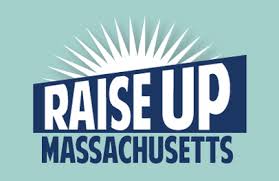By mid-November, the MTA and other members of the Raise Up Massachusetts coalition had collected more than enough signatures to qualify a proposed constitutional amendment for the ballot. The amendment would raise about $1.5 billion annually for public education and transportation. The coalition as a whole had amassed more than 150,000 signatures as of Nov. 16. More than 29,000 of them were collected by MTA members. “The MTA committed to collecting 20,000, and we exceeded that goal,” said MTA President Barbara Madeloni. “This shows what we can do when we join in collective action as a union and as a member of a progressive coalition. Members understand that we need more resources for our students, our schools and our communities.” The total number of raw signatures collected is far more than the 64,750 certified signatures that must be submitted to the secretary of state’s office by Dec. 2 to set the wheels in motion to get the amendment on the 2018 ballot. If passed, the amendment would raise new revenues through a 4 percent additional tax on annual income over $1 million. That threshold would be adjusted for inflation in the future. News of the successful signature drive came just weeks after the Foundation Budget Review Commission concluded that the state is underfunding public schools by roughly $500 million a year. Cindy Tranfaglia, a building representative and a history teacher at Revere High School, was one of hundreds of local activists who found it easy to persuade members to sign. “Just about everyone signed, even the principal. I only had one person who said, ‘I have to think about it and will get back to you later,’” Tranfaglia said. Tranfaglia added that petitioners made it clear in at least one case that signing would help get the initiative before voters rather than serve as a guarantee of support for the amendment itself. Once certified, the initiative must be approved by at least 50 of the state’s 200 senators and representatives in two consecutive joint legislative sessions. Supporters will have almost three years to make the case for the plan and to dispel several myths. One is that Massachusetts is a “tax-and-spend” state. Reporter Evan Horowitz set the record straight on that issue in a Nov. 4 Boston Globe article titled “‘Taxachusetts’ is a lie. Here’s why.” Horowitz concluded, “Massachusetts may be a very liberal state, but it hardly takes a tax-and-spend approach to governance. Taxes are low, compared to other states, and government spending is even lower.” Spending here is particularly low in two areas that would benefit from the Raise Up amendment. “Relative to the size of our economy, the Bay State ranks dead last in spending for highways, roads, and bridges, and comes out among the bottom 10 in terms of higher education spending,” Horowitz wrote. He noted that Massachusetts ranks 24th out of the 50 states in the share of income paid for all state and local taxes combined — mainly income, sales and property taxes. In New England, only New Hampshire residents pay a smaller share. Creating a higher rate for the very wealthy requires a constitutional amendment because the Massachusetts Constitution requires a flat tax rate on earnings. Previous attempts to amend that requirement have failed, mainly because they appeared to give too much discretion to the Legislature to raise rates on middle-income residents. The Raise Up proposal differs from the earlier ones because it allows just one higher bracket affecting only the very wealthiest taxpayers. A person making up to $1 million a year would not pay any more. The new rate would only affect annual income over $1 million. The initiative also clearly spells out that the money must be spent for “quality public education and affordable public colleges and universities, and for the repair and maintenance of roads, bridges and public transportation.” “The 1 percenters have gotten richer and richer while the rest are falling behind and experiencing profound economic vulnerability,” Madeloni said. “We now have a great opportunity to make the tax system fairer while raising funds to improve our schools and make our public higher education system more affordable. “This is a great start to the campaign,” she said. “I look forward to members continuing to bring their energy and experience throughout the legislative process and the ballot campaign itself.”
For more information and updates, please visit www.massteacher.org/revenue or www.raiseupma.org.
